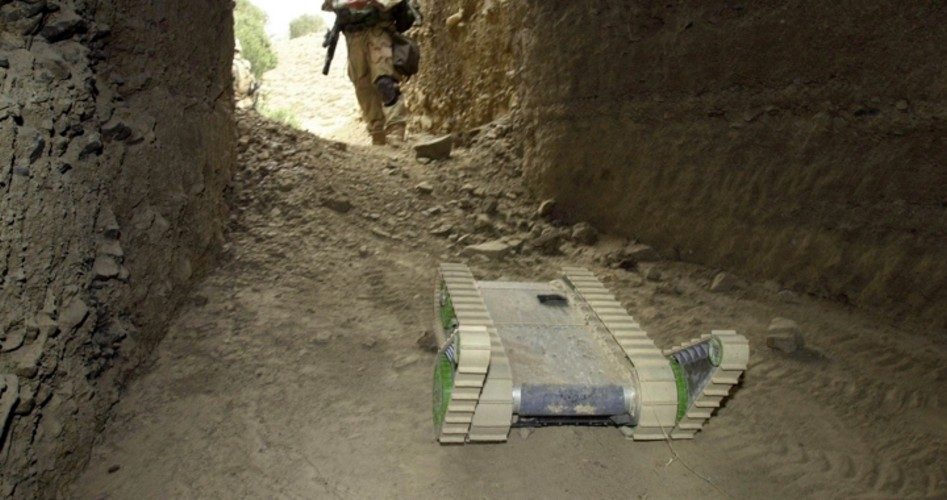
The U.S. Department of Defense will soon spend about $1 billion to deploy robot soldiers in the field, alongside — and eventually in place of — human troops.
“Within five years, I have no doubt there will be robots in every Army formation,” said Bryan McVeigh, the Army’s project manager for force protection, as quoted in an article published by Bloomberg. McVeigh reported that there have been about 800 robots put into military service within the last 18 months.
“We’re going from talking about robots to actually building and fielding programs,” Bloomberg reports, quoting McVeigh. “This is an exciting time to be working on robots with the Army.”
The American branch of the British-based science and technology conglomerate QinetiQ and the Chelmsford, Massachusetts-based Endeavor Robotics have received the lion’s share of the contracts to develop the robot warriors.
Information provided by the two companies about their interests reads appropriately vague and futuristic. Each boasts of their global clientele.
Endeavor Robotics claims:
Endeavor Robotics is the world’s leading provider of battle-tested Unmanned Ground Vehicles (UGVs). We have delivered more than 6,500 robots to customers in over 40 countries. We partner with U.S. and international defense forces, law enforcement, energy and industrial users to design and build innovative robotic solutions that support a wide range of missions.
QinetiQ reports:
We offer our customers world-class expertise in advice, services (particularly test and evaluation) and innovative technology-based products.
We deploy our scientific and technological knowledge, proven research capabilities and unique, purpose-built facilities to provide both services and products that meet the needs of a wide range of global customers. We operate primarily in the defence, security and aerospace markets and our customers are predominantly government organisations, including defence departments, as well as international customers in other targeted sectors.
Given the global dealings of the Pentagon’s robot manufacturers, there seems there would exist the potential that the armed androids might turn on their human commanders, being programmed to prefer the company’s bottom line to the country’s banner.
Regardless, the Pentagon is plowing new ground in the use of this newest generation of robots, as reported by Bloomberg:
During combat operations in Iraq and Afghanistan, the Defense Department amassed an inventory of more than 7,000 robots, with much of the hardware designed to neutralize improvised explosive devices (IEDs).
The Army’s current approach is to field more inter-operable robots with a common chassis, allowing different sensors and payloads to be attached, along with standardized controllers for various platforms, said McVeigh, a retired Army colonel.
These “various platforms” include, according to Sean Bielat, Endeavor’s chief executive officer, weaponizing these robots. Bielat insists that at present the interest in these armed anthropomorphic soldiers is “not particularly strong.”
With active-duty U.S. military troops stationed in nearly 150 countries and with an ever-expanding battlefield in the so-called War on Terror, that interest seems likely to grow as the demand for deployable “assets” increases under one presidential administration after another.
There are others who foresee a future filled with conflict, not between nation and nation, but between humans and the killers we create to “protect” us.
“It seems inevitable that technology is taking us to a point where countries will face the question of whether to delegate lethal decision-making to machines,” said Paul Scharre, a former Army Ranger.
“If we went to war and no one slept uneasy at night, what does that say about us?” Scharre added, as quoted in the Bloomberg article.
That is the most pertinent and urgent question.
What does it say about a people who are eager to go to war and who kill others without personal danger or the threat of fatal consequence?
The generations of men who founded the United States and who fought a war against the world’s most potent imperial military took killing — even in war — very seriously. This is a lesson they learned from those ancient and modern thinkers who influenced their worldview.
One of the most influential of the many men whose works were studied by our Founding Fathers was Hugo Grotius.
Historian Jim Powell said this about the influence of Grotius on our Founders: “Thomas Jefferson and James Madison considered Grotius a leading authority on resolving international disputes. Lord Acton declared, ‘It would be easy to point out … a sentence of Grotius that outweighs in influence the Acts of fifty Parliaments.’”
In Grotius’s book The Rights of War and Peace, published in 1625, he warns of the assumption that killings committed in war are per se justified. Grotius wrote:
We then first declare, if the Cause of the War be unjust, tho’ it be undertaken in a solemn Manner, yet all the Acts of Hostility done in it are unjust in themselves. So that they who knowingly do these Acts, or join in the acting of them, Are to be accounted in the Number of those, who without Repentance cannot enter into the Kingdom of Heaven.
So, while it is inarguably better that robots be blown apart by bombs than American servicemen, we must return to the wisdom of our Founding Fathers and learn that before we commit to combat, which is always the cause of unnecessary death, we must be sure that our cause is just and that God will justify our killing of his creation.
Photo of U.S. Army mine-clearing robot from 2002: AP Images



